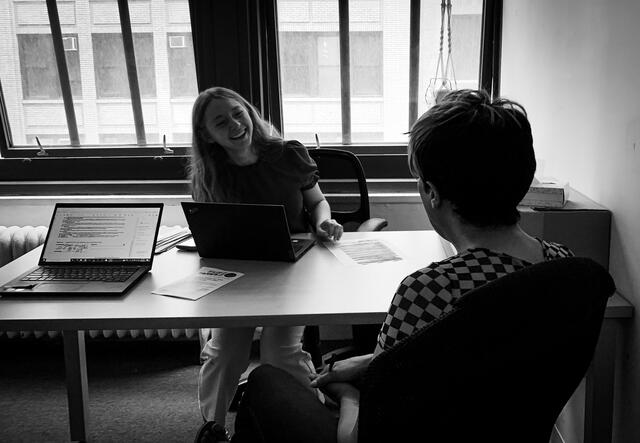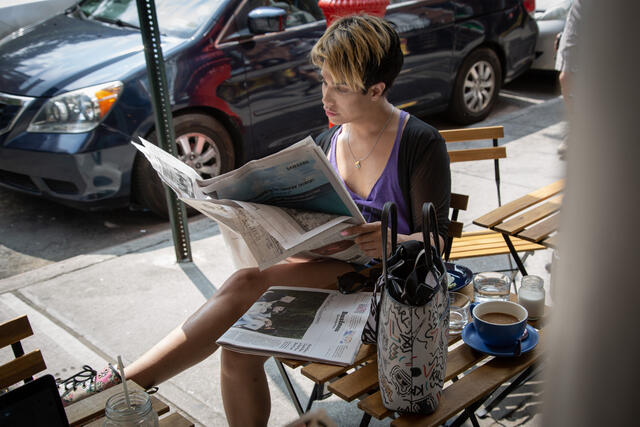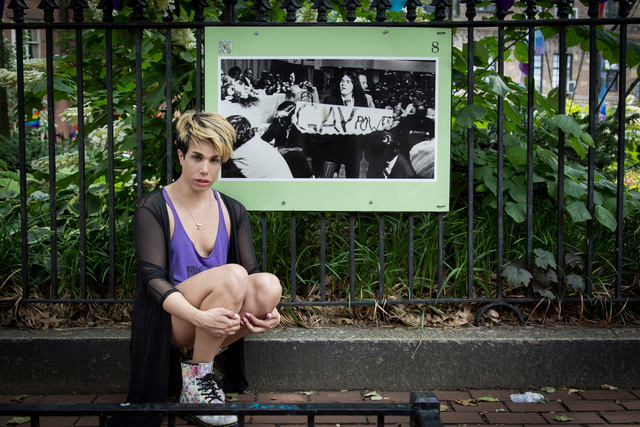
Pride month is celebrated every June, in remembrance of the Stonewall Riots, a series of gay liberation protests that took place in New York City in 1969. This commemorative month recognizes the impact that lesbian, gay, bisexual, transgender, queer, and intersex (LGBTQI+) people have had locally, nationally, and internationally, while also illuminating some of the key issues persisting for this community, in order to prompt change and work towards safety and inclusion for everyone.
While there have been tremendous strides over the past fifty years in the United States, including the legalization of same-sex marriage in 2016, this is not the case in other parts of the world. In almost 70 countries same-sex relations are criminalized and, in eleven countries, punishable by death. Even in the United States, regressive policies, gender-based violence, and discriminatory rhetoric and belief systems remain.
LGBTQI+ identifying refugees, asylees, and other humanitarian individual entrants face unique burdens because of their intersecting identities. Navigating their gender identity, sexual orientation, and expression within the context of resettlement and integration brings forth a distinct experience of alienation.
The “Cycles of Displacement” report conducted by the International Rescue Committee (IRC) and USAID From the American People in June 2021 expands on this alienation.* Through this research, the IRC found that humanitarian responses and service delivery often exclude LGBTQI+ people and communities, subjecting them to an even higher risk of harm. The process of a “Cycle of Displacement” illustrates the cumulative and varied ways in which displacement is imposed, as follows:
displacement by family -> displacement by country -> displacement when accessing services
Each cycle enacts a perpetual experience of rejection and removal, prompting a feeling of not existing within any kind of protective family, community, or protective network.
Supporting LGBTQI+ Clients at the IRC – Staff Reflections
The Intensive Casework Management (ICM) program at the IRC in NY and NJ supports LGBTQI+ clients with their resettlement goals. Rabeea Barakat, an ICM Casework Assistant at the IRC in NY, explains that "Intensive case management is a process that facilitates the achievement of client wellness, autonomy and self-sufficiency through advocacy, assessment, planning, communication, coordination, monitoring, and service facilitation.”
One of the services that the ICM team in NJ supports with is processing a name change for transgender clients. Adrienne Villondo, an ICM caseworker in NJ, shares how:
“the biggest challenge in this process [for clients] is having to constantly advocate for their identity, especially when they are still discovering it themselves.”
Adrienne has connected clients with lawyers and the social security office to carry out their name change, but there are often significant roadblocks with their I-94 being under their previous name or deadname, especially when trying to access services, such as food distributions or health services, where identification is required. Since their status is typically under their deadname, it appears that they are here illegally or do not have a status. Many clients share how this process feels like an erasure of their personhood, as they have to ignore one part of their identity in order to have the other one validated.
Other challenges take place in regard to safety and housing, especially when staying in shelters, which are often separated by gender. Transgender individuals can be denied access to temporary shelters because the gender listed on their identification documents does not match their appearance or can be forced to stay in a shelter of a gender they do not identify with, causing additional distress and dysmorphia.
From his experience supporting LGBTQI+ refugees, Rabeea explains “What makes the ICM journey of these clients more difficult is the trauma of surviving arrest or assault.” Despite this, Rabeea believes that “the clients who belong to this colorful community have always shown passion and the will to start a new life.”
These clients often have a lack of family support and to address this, IRC services are centered around fostering a sense of community and accessing mental health services or support groups when needed.
The IRC in NY and NJ recognizes the diverse backgrounds and forms of discrimination that clients face, both here and in their country of origin, including persecution for their sexual or gender identities and barriers to accessing critical services. Caseworkers and other IRC staff work to ensure that clients who are members of the LGBTQI+ community feel safe and understood during their resettlement experiences.
See below to read about Phoenix**, a client at the IRC in NY, who has experienced some of the aforementioned challenges. She has shown resilience and bravery throughout her journey.

Phoenix came to the United States nearly five years ago to escape prejudice and harm from her family for being a trans woman. Questions about her identity began inside of her as a child, when she was five or six years old, and she has since then learned to accept that she is different. As she reflected on her self-discovery, she expressed:
“It’s not just about sex but about who you are as a person, how your brain is, and how your personality is.”
The most challenging part of her journey has been her living situation, as her gender identity is often not respected and she feels unsafe and out of place in male shelters. Financial stressors, such as issues with her credit score and finding a job, have also been a challenge.
The IRC in NY has supported Phoenix with accessing food, housing, and even a loan so she could graduate from cosmetology school.
With gratitude, Phoenix states that at the IRC:
“the employees actually work with the clients, seeing their needs rather than seeing it as just another part of their job.”
Phoenix is thankful to have this new beginning and states that she “loves the people in the United States” and has felt more accepted in New York City than anywhere else, despite some of the challenges she has experienced. “I’m a good person in a bad situation,” she declares. She is proud of not being too hard on herself.
In the future, Phoenix hopes to first stabilize her situation and then focus on taking the bar exam, which she has been studying for. She also hopes to find a new living situation where she feels safe and comfortable.

Moving Forward – Hopes for the Future
The United States is a place of refuge and hope for many LGBTQI+ individuals that escape disaster, whether it be from war, economic collapse, or even violence from their own family. It is imperative to ensure that humanitarian support takes into account the unique barriers these individuals face in both their countries of origin and when resettling in their new homes.
The IRC in NY and NJ is proud to work with and support LGBTQI+ clients and also recognizes that there is room to grow. For those that work in the humanitarian sector, Adrienne recommends “partnering with other organizations to address any gaps in services, reading up and educating yourself on these issues, and speaking up if you see discrimination in the field.” Rabeea echoes these suggestions and ultimately hopes “to witness more reassuring programs reinforced by legislative efforts to ensure that individuals are safer in their new home.”
* Roth, D., Blackwell, A., Canavera, M., Falb, K. (2021). Cycles of displacement: Understanding violence, discrimination, and exclusion of LGBTQI people in humanitarian contexts. New York: International Rescue Committee
** name changed to protect client’s identity
Written by Development Coordinator Emma Young